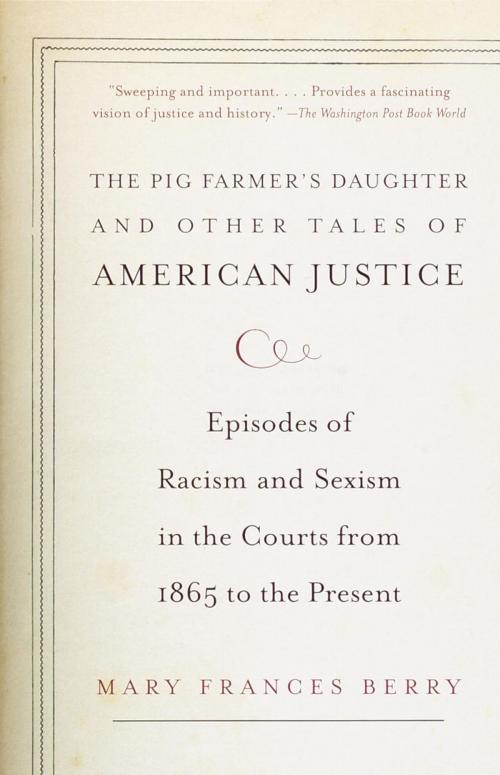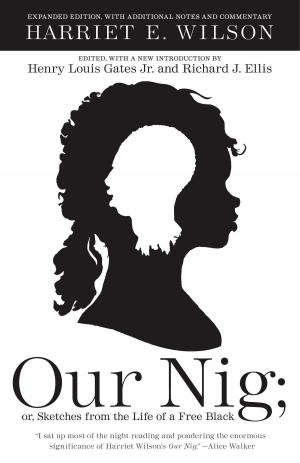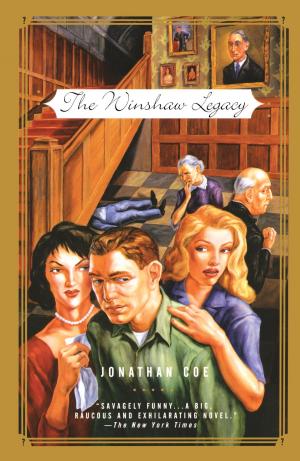The Pig Farmer's Daughter and Other Tales of American Justice
Episodes of Racism and Sexism in the Courts from 1865 to the Present
Nonfiction, Reference & Language, Law, Jurisprudence, Civil Rights, History, Americas, United States| Author: | Mary Frances Berry | ISBN: | 9780307797292 |
| Publisher: | Knopf Doubleday Publishing Group | Publication: | July 20, 2011 |
| Imprint: | Vintage | Language: | English |
| Author: | Mary Frances Berry |
| ISBN: | 9780307797292 |
| Publisher: | Knopf Doubleday Publishing Group |
| Publication: | July 20, 2011 |
| Imprint: | Vintage |
| Language: | English |
From the head of the U.S. Civil Rights Commission and noted professor of law and history at the University of Pennsylvania, a groundbreaking book that examines both civil and criminal court cases from the Civil War to the present, to reveal the impact of stereotyping--race, class, gender--on the American legal system.
The question Mary Frances Berry asks: Whose story most strongly influences the making of legal decisions in the American justice system? Using previously unexamined material from state appellate civil and criminal court cases--cases of rape, seduction, and paternity disputes, and cases dealing with murder, inheritance, and property disputes in which sexual relations are at the heart of the story--Berry takes us through two centuries of American case law to show how attitudes toward gender, race, class, and sexuality have materially affected, and continue to affect, judicial decision-making.
Among the many cases Berry discusses:
Alabama, 1867--A white woman sues her husband for divorce in both the lower and state supreme courts because of his sexual relationship with a former slave, and is denied her petition on the basis that a sexual relationship between a white man and a black woman is "of no consequence."
New York, 1932--In a surprising victory, the longtime mistress of a theater owner successfully contests her lover's will and proves her right to inherit a wife's portion of the estate.
Texas, 1984--A suit by a woman against her female lover ends in a decision that allows the court to avoid acknowledging the existence of a lesbian relationship.
And, in the 1990s, we see the cases of William Kennedy Smith, Mike Tyson, and O. J. Simpson in a new context.
Moving stories, shocking stories, ironic stories, tragic stories--a book that fascinates in terms of its human drama, by its demonstration of the ways in which prejudice affects justice, and by its account of how the law has evolved (or hasn't) as our racial, social, and sexual attitudes have changed.
From the head of the U.S. Civil Rights Commission and noted professor of law and history at the University of Pennsylvania, a groundbreaking book that examines both civil and criminal court cases from the Civil War to the present, to reveal the impact of stereotyping--race, class, gender--on the American legal system.
The question Mary Frances Berry asks: Whose story most strongly influences the making of legal decisions in the American justice system? Using previously unexamined material from state appellate civil and criminal court cases--cases of rape, seduction, and paternity disputes, and cases dealing with murder, inheritance, and property disputes in which sexual relations are at the heart of the story--Berry takes us through two centuries of American case law to show how attitudes toward gender, race, class, and sexuality have materially affected, and continue to affect, judicial decision-making.
Among the many cases Berry discusses:
Alabama, 1867--A white woman sues her husband for divorce in both the lower and state supreme courts because of his sexual relationship with a former slave, and is denied her petition on the basis that a sexual relationship between a white man and a black woman is "of no consequence."
New York, 1932--In a surprising victory, the longtime mistress of a theater owner successfully contests her lover's will and proves her right to inherit a wife's portion of the estate.
Texas, 1984--A suit by a woman against her female lover ends in a decision that allows the court to avoid acknowledging the existence of a lesbian relationship.
And, in the 1990s, we see the cases of William Kennedy Smith, Mike Tyson, and O. J. Simpson in a new context.
Moving stories, shocking stories, ironic stories, tragic stories--a book that fascinates in terms of its human drama, by its demonstration of the ways in which prejudice affects justice, and by its account of how the law has evolved (or hasn't) as our racial, social, and sexual attitudes have changed.















